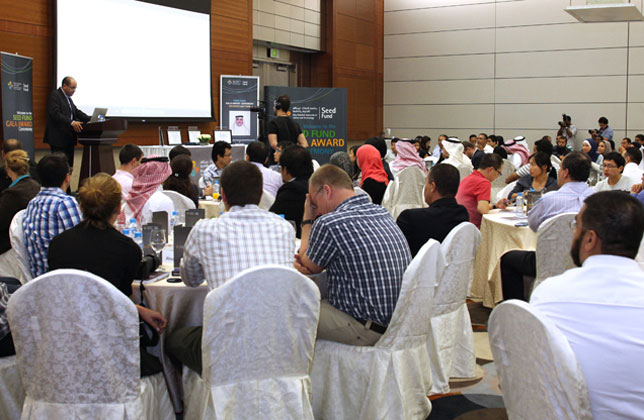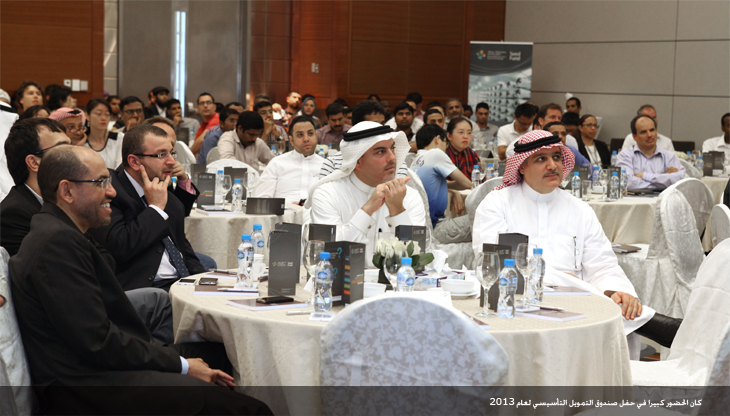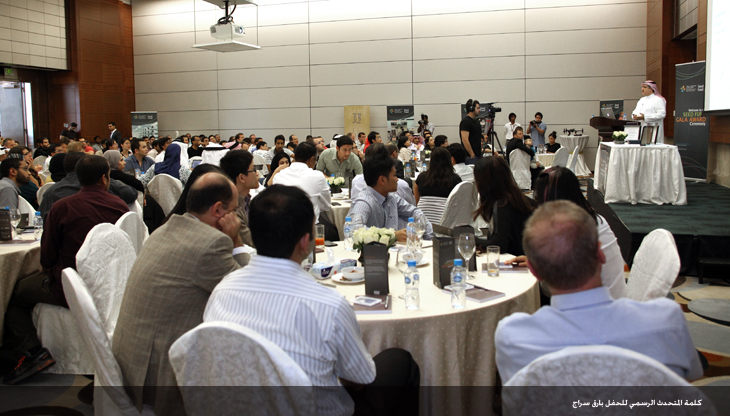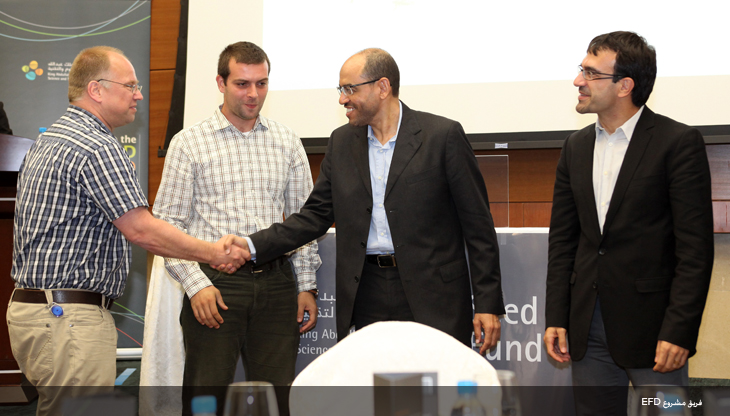Seed Fund Gala: 2013 Fall Round Winners Announced

The KAUST Seed Fund Team recently held a gala lunch and award ceremony to unveil the four winning teams from the 2013 Seed Fund Fall Round. During his opening remarks, the VP Economic Development, Amin M. Al-Shibani, outlined that KAUST was created "with the vision to accelerate technology-based economic development." He highlighted the fact that the Seed Fund has been a successful mechanism to achieve this goal since, within its first six rounds, 21 projects were funded; resulting in the creation of three companies along with 15 active jobs.
Further emphasizing this success, the event's keynote speaker, Barig Siraj, delivered a talk to the overflowing crowd of over 200 attendants about "Creating Healthy Entrepreneurial Ecosystems in Saudi Arabia." Barig Siraj said: "In my opinion, KAUST is leading in the commercialization of ideas in the Kingdom of Saudi Arabia."
The four new additions to the Seed Fund program's contribution to the Kingdom's entrepreneurial ecosystem, announced at the event were:
- Falcon Viz (3D Aerial Scanning & Modeling System). Team members: Neil Smith, Mohamed Shalaby, Luca Passone
- Nano Assembly (Low-Cost & High-Quality Quantum Dots). Team members: Jun Pan, Ala'a El-Ballouli, Osman Bakr, Edward Sargent
- ROFix (Reverse Osmosis Fouling Index). Team members: Noreddine Ghaffour, Rinaldi Rachman, Mohanned Al Ghamdi
- EFD (Early Fouling Detection for Membrane Systems). Team members: Szilard Bucs, Sacco Hekkert, Marc Staal
Presenting Falcon Viz, Neil Smith described the project as a "new 3D aerial scanning solution for documentation and inspection." This technology can be particularly useful for government organizations and private companies involved in city planning, cultural heritage site management and preservation, construction, as well as real estate. Such stakeholders have a common need to be able to physically see the layouts and structures of their assets in real-time. Integrating multi-rotor mini-copters, this new system captures 3D models through high-resolution photos.
Another innovative project, Nano Assembly, presented by Jun Pan, proposes a process to mass-produce quantum dots nanoparticles at a significantly lower cost and higher quality than what is currently available on the market. Their patent-pending technology, recently published in a high-impact journal, has the potential to open new market opportunities in many industrial areas such as LED displays and solar cells.
The other two projects tackle the common issue of water desalination plant performance. As Noreddine Ghaffour from the ROFix team pointed out, "we are currently desalinating around 16 million tons of seawater to turn it into fresh water." Around fifty percent of this large amount of drinking water is produced using a membrane-based reverse osmosis (RO) process. But the challenge facing plant operators is the poor performance of these membranes caused by seawater fouling. This results in frequent shutdowns and the costly use of chemicals to clean the membranes.
The solution proposed by the ROFix project is to install a device between the desalination plant and the seawater's pre-treatment step that will alert plant owners by identifying the intake water's fouling index. The ROFix device can predict different types of fouling in the early stage so the right action can be taken before fouling occurs. The unit is fully automated, portable and easy to operate. This will help in preventing membrane fouling in RO desalination plants.
The final presenter, Szilard Bucs, showcasing the EFD (Early Fouling Detection for Membrane Systems) project indicated that the novelty of their innovation is that their device is the first on the market to monitor and characterize the fouling as it occurs within the system. "So our system will be part of the existing installation and will act as a window so the plant operators will be able to see what is happening inside their installation; on the surface of the membrane and inside the membrane," as he explained. The team believes that their fouling monitoring device can increase the membrane lifetime by twenty percent and decrease the chemical costs by around thirty percent.
About the Seed Fund
The Seed Fund is a product development funding mechanism that can help move promising ideas further toward commercialization, and ultimately lead to the formation of a new business. The Seed Fund is open to all KAUST faculty, students, staff, researchers and post-docs, and offers funding of up to US$ 200,000 as well as advisory, support and mentorship up to 24 months.
Seed Fund will open the new round, Spring 2014, in February 2014. Interested applicants can submit their applications at Seed Fund's website.
For further question, please contact Seed Fund team at seedfund@kaust.edu.sa




